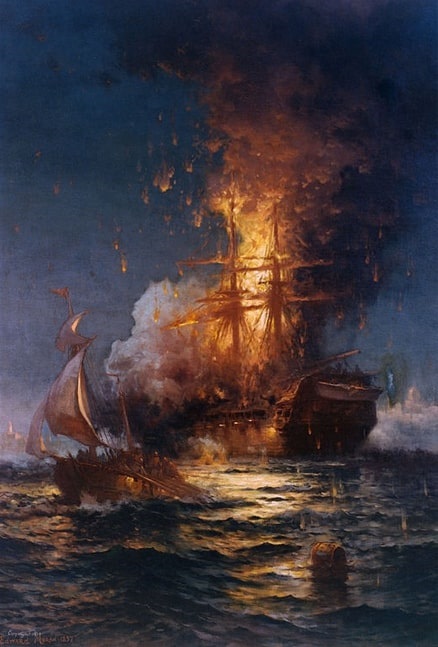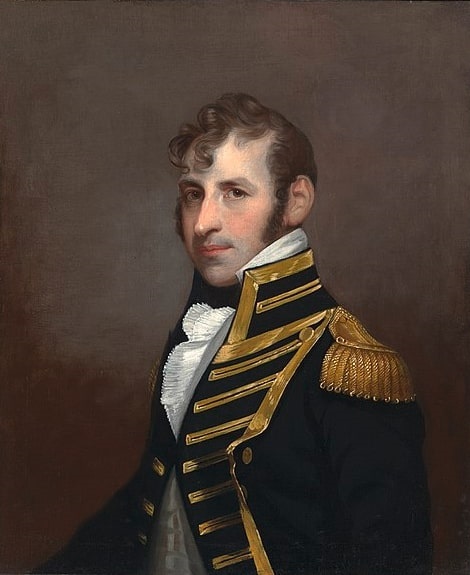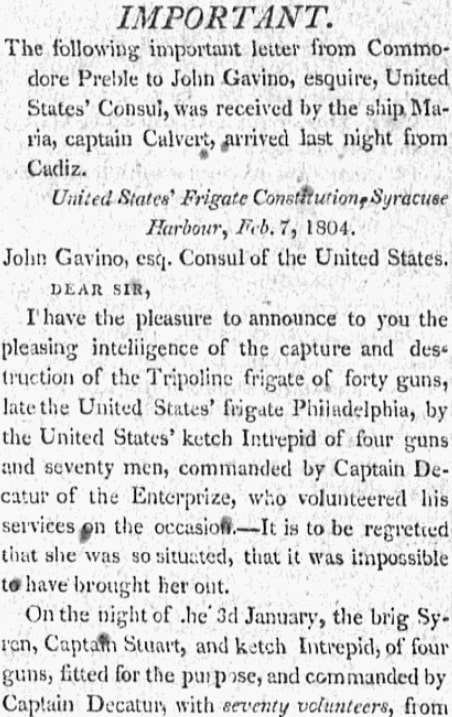It was the stuff of legends, and would make any Hollywood screenwriter drool. Under cover of darkness, Lt. Stephen Decatur Jr. and 70 brave volunteers slipped into Tripoli Harbor the night of 16 February 1804. Their mission: destroy the USS Philadelphia in order to prevent the captured 44-gun frigate from becoming part of the enemy’s fleet.

They did this right under the castle walls of the arch-enemy, Pasha (or Bashaw) Yusuf Karamanli, not to mention the 115 heavy cannons ringing the harbor, the Tripoli fleet with another 100 heavy guns, and 20,000 enemy troops encamped nearby.
It was a near-suicidal mission, but Lt. Decatur and his men never flinched. Their country was at war with the Barbary Pirates, and they had a job to do.
A number of connections involved in this story prove that truth is stranger than fiction. For one thing, when the Philadelphia was commissioned on 5 April 1800, her first captain was none other than Stephen Decatur Sr., a Revolutionary War hero and father of Lt. Decatur.
When the Philadelphia ran aground on a reef off Tripoli Harbor on 31 October 1803, with Capt. William Bainbridge in command, the Tripolitan ketch Mastico participated in her capture. Two months later, the Mastico was captured by the USS Enterprise – with Lt. Stephen Decatur Jr. in command – on 23 December 1803.
The Mastico became part of the U.S. fleet and renamed USS Intrepid. When Commodore Edward Preble, head of the American Mediterranean fleet, decided on the daring plan of slipping a boat into Tripoli Harbor to destroy the Philadelphia, the Intrepid was chosen because, as a North African ketch, it stood the greatest chance of getting close enough without raising suspicion.

It was his father’s former ship that was going to be destroyed, and the vessel used to execute the plan was one he had captured: Lt. Decatur stepped forward and volunteered to lead the mission, despite the dangerous odds against success. Seventy resolute souls offered to join him.
The aptly-named Intrepid, accompanied by the Syren, sailed to Tripoli, arriving on 7 February 1804. A fierce storm blew them back out to sea, and it was not until February 16 that the ships were in position. While the Syren stayed outside to help with the escape if necessary, the Intrepid slipped into the harbor at 7:00 p.m.
Around 9:30 it limped up to the Philadelphia, pretending it had been damaged in the storm and lost its anchor. Lt. Decatur and 60 of his men quickly boarded the huge frigate. Aware the sound of gunfire would alert the harbor’s defenders, the men used knives and swords to kill 20 of the Philadelphia’s guards before the rest lowered a boat to escape, with some jumping overboard.
The Americans went below deck to set fire to the ship, then stayed on board to make sure the fire caught and spread. When the blaze reached the rigging the men scrambled aboard the Intrepid, Lt. Decatur the last to leave the Philadelphia, and desperately raced out of the harbor with cannons and rifle shots whizzing overhead and exploding all around them.
Somehow, amazingly, they made it, with none killed and only one man wounded. The Intrepid and Syren sailed across the Mediterranean to rejoin the federal fleet in Syracuse Harbor, Sicily, on February 19. The mission had been a complete success, and Lt. Stephen Decatur Jr. was the nation’s newest military hero.

Here is a transcription of this article:
IMPORTANT.
The following important letter from Commodore Preble to John Gavino, esquire, United Sates’ Consul, was received by the ship Maria, captain Calvert, arrived last night from Cadiz.
United States’ Frigate Constitution, Syracuse Harbor, Feb. [19], 1804.
John Gavino, esq., Consul of the United States.
Dear Sir,
I have the pleasure to announce to you the pleasing intelligence of the capture and destruction of the Tripoline frigate of forty guns, late the United States’ frigate Philadelphia, by the United States’ ketch Intrepid of four guns and seventy men, commanded by Captain Decatur of the Enterprise, who volunteered his services on the occasion. It is to be regretted that she was so situated, that it was impossible to have brought her out.
On the night of [Feb. 3], the brig Syren, Captain Stewart, and ketch Intrepid, of four guns, fitted for the purpose, and commanded by Captain Decatur, with seventy volunteers, from the squadron, sailed for Tripoli, with orders to burn the frigate in that harbour. They this day returned, having executed my orders much to my satisfaction.
On the night of the 16th ult. Captain Decatur entered the harbour of Tripoli, with the ketch, laid her alongside the frigate, and, in a gallant and officer-like manner, boarded and carried her against all opposition. After gaining complete possession, he proceeded to fire her with success, and left her in a blaze, in which she continued until she was totally consumed. He had none killed, and only one wounded. The Tripolitans had between twenty and thirty men killed on the deck. One large boat load made their escape, some men ran below and perished in the flames; but the greater part jumped overboard. She was moored close to the batteries, with all her guns loaded, and two of their corsairs, full of men, lay within a half musket shot of her. A fire was kept upon the ketch by the batteries, Bashaw’s castle, and corsairs. Not a musket or pistol was fired by our men, everything was settled by the sword.
The Syren anchored without the harbour to cover the retreat of the ketch, and sent her boats to assist, but unfortunately they did not arrive in season, as the business was accomplished, and the ketch on her way out, before the boats met her. Had they got in sooner, it is probable some of the Tripolitan corsairs would have shared the fate of the frigate.
Very respectfully, I am,
Dear Sir,
your obedient servant,
Edward Preble.
Note: An online collection of newspapers, such as GenealogyBank’s Historical Newspaper Archives, is not only a great way to learn about the lives of your ancestors – the old newspaper articles also help you understand American history and the times your ancestors lived in, and the news they talked about and read in their local papers.
